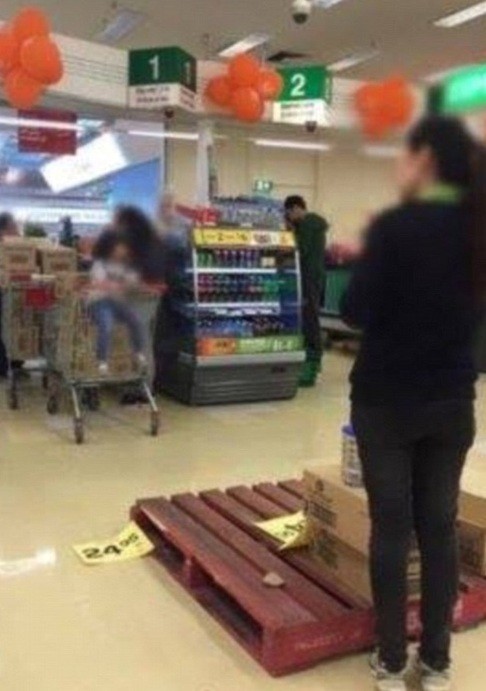Hard to swallow: Australia is cracking down on China’s black market hunger for baby formula
PUBLISHED : Wednesday, 20 January, 2016, 9:25am
UPDATED : Wednesday, 20 January, 2016, 9:51am
The Washington Post

A shopper wheels away a trolley laden with baby formula in a photo that went viral in Australia in November. Photo: Jessica Hay/Facebook
After Mandy Santos’s teething eight-month-old son woke her every two hours one night demanding to be fed, she walked into a Sydney supermarket looking for a can of baby formula.
As the 31-year-old professional violinist stood in the baby-food aisle, trying to choose a product, her two-year-old daughter hung onto her leg, chewing on a cookie. Her little boy was with a relative.
“He's very clingy and I'm too tired,” Santos said, referring to the baby. “I'm going to wean him slowly.”
But there was a catch: Despite fully stocked shelves of formula made by Procter & Gamble, Nestlé, Danone and others, this supermarket in the Coles chain now sells only two cans to each customer at a time. The rule is designed to frustrate a thriving underground market that ships Australian formula to Chinese cities, where only 16 per cent of new mothers breast-feed their children exclusively, according to China’s National Health and Family Planning Commission.

A photo taken by shopper Jessica Hay in an Australian supermarket in November shows a person with two shopping trolleys full of baby formula. Photo: Jessica Hay / Facebook
Private profiteers can resell a 1kg can of formula in China for as much as three times the Australian price, said Michael Harvey, a dairy-industry analyst at Rabobank, a big agricultural financier. “There is clearly money in it,” he said in an interview.
Several milk-contamination scandals, including one that involved the hospitalisation of 54,000 children in 2008, have made many people in China suspicious of their food supply. The one-child policy, which is now being abandoned, made the 16 million babies born every year in China even more precious to their parents.
Experts say Chinese food rules are as tough as Australia’s - they are both based on international standards known as the Codex Alimentarius, which are overseen by the World Health Organization and the UN Food and Agriculture Organization. But many Chinese parents do not trust their government to enforce the rules.
“The Chinese consumer wants the formula with the English writing on it,” said Jan Carey, the chief executive of Australia’s Infant Nutrition Council, a lobby group for baby-food makers.
Australia is not the only place where sales limits have been imposed. Britain, Hong Kong and New Zealand also have them. But the problem is particularly acute in Australia. The country’s clean environment and reputation for safe food appeals to Chinese parents, according to Simon Hansford, a formula consultant who has been to China more than 80 times and once owned a milk-powder factory.
“They love their Louis Vuitton and BMWs,” he said in an interview. “They think if the formula is sold in the big supermarkets and pharmacies, it's a famous brand.”
While well-intentioned, the supermarkets' policy means exhausted Australian mothers have to stock up every couple of weeks or seek out stores with more generous limits. At the Coles visited by Santos, the violinist, a notice in English and Chinese says: “While this is regrettable we are trying to help make this product available for our customers who require it.”
The rule is not always enforced. Two months ago, a woman from the southern city of Melbourne posted a photo on Facebook of four people filling two shopping carts with baby formula. “The group of four adults cleared a pallet of more than 50 tins despite the store's four tins per person limit,” she told the Sydney Morning Herald newspaper. “It felt like a smooth operation, like they did this all the time.”
Chinese buyers send the formula home by regular mail, a process that does not require special paperwork if the shipment weighs less than 10kg. Reports that temporary shops are opening in busy areas to sell and ship formula suggest that the trade is becoming more sophisticated.
A spokeswoman for Australia’s Department of Agriculture and Water Resources said the agency is investigating allegations that formula is being sent overseas in breach of shipping rules.
Ironically, most of the formula sold in Australia comes from elsewhere. The most popular brand, Aptamil, is made by French diary giant Danone in New Zealand. In China, Danone sells formula under the Karicare brand, which it promotes as a 100 per cent New Zealand product.
Breast-feeding advocates are aghast at the trade, which they think preys on vulnerable women in China. Nina Berry, a researcher at the Sydney School of Public Health and a spokeswoman for the Australian Breastfeeding Association, described the prices being paid for foreign formula in China as “extortionate” and questioned the ethics of food companies that market the product. Some experts want China to ban the advertising of baby formula.
Nonetheless, investors sense big profits coming. Baby-food makers were among the most successful companies on the Australian stock exchange last year. A US$5,000 investment in one company, Bellamy’s Organic, on January 1 last year was worth $49,000 by New Year’s Eve, according to CommSec, a stockbroker.

